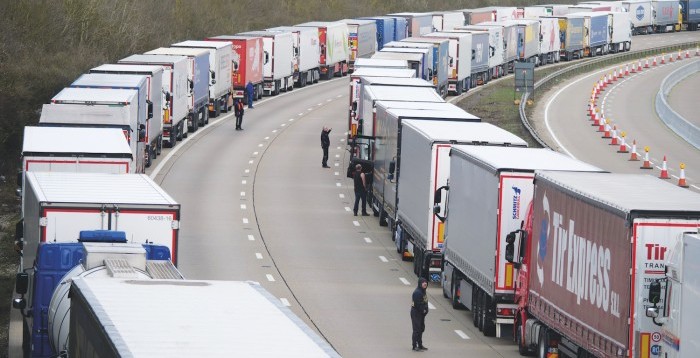Exporters to the EU could face massive queues in Kent and two-day delays to trade after the Brexit transition period ends, Cabinet Secretary Michael Gove has warned.
In a letter to business organisations, seen by the BBC, Mr Gove, who is responsible for no deal planning, sets out a ‘reasonable worst-case scenario’ where up to 70% of freight trucks travelling to the EU are unprepared for new border controls when they come in at the start of 2021.
According to the Cabinet Office document, there could be ‘maximum queues of 7,000 port bound trucks in Kent and associated maximum delays of up to two days’, due to problems with the busiest ‘shorts straits’ routes Dover to Calais and in the Eurotunnel.
“Both imports and exports could be disrupted to a similar extent,” it says.
The EU is expected to impose full goods controls on the UK, stopping all freight without the correct documentation at the end of the transition period on January 1.
The disruption is predicted to build in the first two weeks of January, and could last three months, or longer should France rigorously apply Schengen passport checks on hauliers at Dover and the Channel Tunnel, the document says.
The letter also raises the prospect of a winter spike in Covid-19 leading to absences of port and border staff.
The intention is to encourage businesses to prepare now for the new border checks in order this level of disruption. The Government said the scenario set out was not a prediction but an illustration of what could be reasonably expected.
Mr Gove’s letter said the changes will apply irrespective of whether or not there is a deal in the UK-EU trade negotiations. He is due to outline the scenario work in the House of Commons today.
But the freight industry has expressed concern recently that the government is not fully prepared with the plans and systems in place to deal with post-Brexit changes, particularly against the difficult economic backdrop of COVID-19.
The BBC reported that a recent meeting between the industry and government was described as a ‘washout’, with insiders describing the relationship as “fraught” and hauliers fearful that they were being cast as the ‘fall guys’ for delays and disruption likely in January.
There are further issues that would arise if no trade deal is agreed, such as a requirement for hauliers to rely on special permits rationed by the Department for Transport. Industry sources have raised the possibility that the UK would have to sign up to EU rules limiting driver hours, in order to get access to EU roads, the BBC reports.
‘Glaring weaknesses’
The British Meat Processors Association (BMPA) recently warned that ‘glaring weaknesses’ in the Government’s post-Brexit export plans will put £1.2 billion of annual meat exports at risk along with thousands of jobs unless they are urgently addressed.
In a strongly-worded statement, the association says it has ‘lost patience’ with the Government and calls for it to resolve the outstanding issues before it is too late.
BMPA chief Nick Allen said: “After months of meetings and talks with Government which have yielded little progress, the British meat industry, along with other sectors that rely on overseas trade, has lost patience and we are calling publicly for Government to step up the pace and solve these issues before it is too late.
“With less than four months to go Britain has a woeful lack of infrastructure and people to operate the new export system which if not addressed, will result in massive delays, extra cost and lost orders.”
The BMPA has also urged the Government to provide clarity on Brexit trading arrangements amid fears meat exports could be compromised by delays in securing Third Country status
A group of eight industry logistics organisations, including the Road Haulage Association, has warned that Britain’s supply chains are at risk of ‘severe’ disruption from new post-Brexit rules unless ministers take urgent action.




